It was a rough night in Kyiv.
I shot straight from sleep into full wakefulness. The explosions, way too near for comfort, jolted my sensory system alert. The night felt ominous, surreal; seared by the sound of drones, sirens, and explosions, the sky alight with tracers. Time seemed to pause; another explosion was sure to come… but when?
After what was perhaps an hour of bombardment there came a lull, allowing me to check in with my body. I was mildly surprised to not find fear. Instead I felt a systemic edginess, like what comes with rock climbing or paragliding: full sensate activation. There was also knot in my gut, as if I had been punched… or as if some force was pressing on my heart from the outside. This knot rose and fell in intensity with the sounds of war. And again, a sustained and profound surreality: Is this really happening?
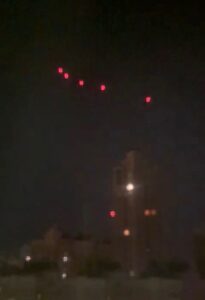
Drones chasing across the night skies of Kyiv
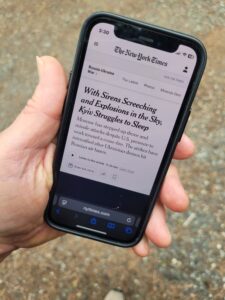
My sleeplessness made the NYT for the first time ever!
I pad quietly into the kitchen to find my host also pacing with restlessness and resolve. She is apologetic, but I remind her that I came here willingly, eyes open. I just want to ground my edginess in information from someone tracking the alert network. I ask: This attack seems more intense than the others; is that true? Yes: it’s bigger, with many more drones. Can your kids really sleep through this? Yes: we checked, they’re still asleep. Why not take shelter in the parking garage again? Because: Crossing the lot to the garage is too risky; there could be debris falling from intercepted drones.
How does one make sense of all this? If I really felt I was about to get blown up, I would be messaging my family to reaffirm my love. Instead, I write – exploring feelings of incredulity and dismay at the chaos and destruction taking place. It makes a certain sense to me that this attack on civilians reflects Russian retaliation for Ukraine’s recent surprise destruction of their military aircraft. But how can it be that our species has not yet built governments and social systems that can stop this type of madness?
This sound clip is fairly muted, so turn it up if you want a taste of Kyiv during a drone attack.
• • • • • • • • • • • • • • • • • • • • • • • • • • • •
In recent weeks when I told people that, following the Integral European Conference near Budapest, I would travel to Kyiv, I was often asked: “Why travel to a war zone? Is it worth the risk?”
Initially I struggled to answer. My key motivators were not rational. A catalyst, though, was that some friends attended the Emerge Ukrainian Pilgrimage in Kyiv last fall, after which I heard stories. I was moved to hear of the profound courage and resilience of the Ukrainian people. Those stories featured a clarity of purpose, a collective spirit, and a determination to uphold democratic ideals that seem to have atrophied in America.
Further pondering reminded me that we naturally desire to be among people who demonstrate the qualities we wish to develop in ourselves. This doesn’t mean that I feel inadequate, or that visiting a place where people are courageous will give me courage. But two realizations arose from my pondering.
First: If Ukraine was not under brutal attack, in a conflict representing the literal frontline of democracy, I wouldn’t go. The land, the people, and the culture of Ukraine are amazing – but those qualities weren’t at the crux of my decision. It is the global impact of this war that gives it particular gravitas. The powerful reslience driving Ukrainians to defend their land – and by proxy, to defend all democracies – is compelling.
Second: As disappointed as I am with America’s clarity of purpose, collective spirit, and commitment to democracy, I wouldn’t make this trip had our last national election yielded a different result. The new American regime is so egregiously corrupt, authoritarian, and regressive that our electorate’s failings are proving cataclysmic. Learning firsthand from Ukraine may help us frame the immense work needed in the USA.
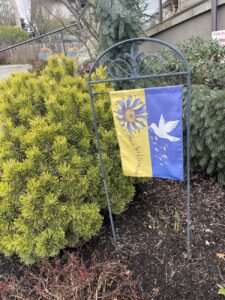
A Ukrainian solidarity flag seen in Bellingham prior to my trip.
• • • • • • • • • • • • • • • • • • • • • • • • • • • •
Three hours in, the attack seems to be abating. I no longer hear drones, and gradually my nervous system eases out of its activated state. At least for now, the small we – those of us in this apartment – have emerged unscathed. The bigger we – the people of Kyiv, all battle-weary Ukrainians, lovers of peace everywhere – are definitely scathed. Some are dead. Some are healing from agonizing wounds. All of us are tainted by the toxic vein of inhumanity that has been displayed this night.
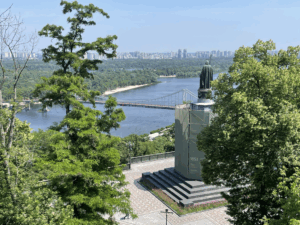
Kyiv is a clean, friendly, cosmopolitan city.
I must make it clear that this essay highlights just one element of my Ukrainian experience. The vast majority of my time in the country was marked by beauty, peace, human connection, joy and wonder. My heart was filled with the kindness, generosity, and warmth of all those I met. It is important, though, to speak directly of the war that is a palpable presence everywhere I went. We must acknowledge the grave threat our allies face, and name the war for what it is: A brutal, unjustifiable, and unwinnable assault. One that keeps dragging on. At the frontlines in the East there is a protracted stalemate. The attacks I experienced in Kyiv were not militarily strategic, only acts of punishment and fearmongering.
And despite this, all the Ukrainians I met showed a remarkable dignity, resolve, and unity. In future essays I will paint a fuller and more fair picture of my experiences.
I’m writing this on my last day in Kyiv, so it seems timely to return to the question of why am I here, and whether I got what I came for.
What eventually crystallized for me was the recognition that this trip is an example of citizen diplomacy. I chose to travel to a war zone for the first time in my life, knowing I could become a casualty of that war. But what I did by choice is nothing compared with what the Ukrainians are doing by force. Courage is inseparable from risk.
Citizen diplomacy means, foremost, showing up: directly experiencing another culture and bringing curiosity to learn from differences. It means building relationships, welcoming others’ lives into my heart, and opening myself to them. It means being an ally, offering solidarity however it may manifest. It means honoring autonomy, sharing wisdom, expressing humility.
It could be argued that this is “not my fight.” Perhaps I should have stayed home rather than place myself at risk for the sake of some diplomacy pipe dream. It would indeed be foolhardy and irresponsible to travel to the other side of the planet just to get blown up. At the same time, there’s something vital about having skin in the game.
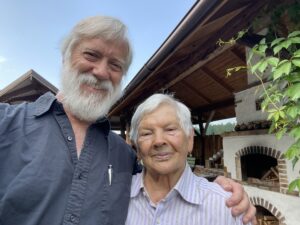
Ludmila befriended me despite the lack of a shared language.
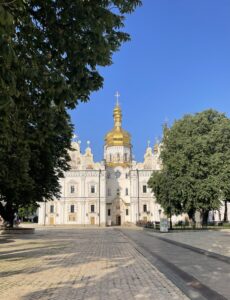
The 1000-year old Dormition Cathedral has been lovingly restored, showing Kyiv’s embrace of its past as well as its future.
Three of the five nights I spent in Kyiv, I lost significant sleep. I know the ominous humming of a drone seeking its target, I’ve felt the dull edge of an explosion rumbling the walls of the apartment complex, I’ve seen the red and orange tracers in the sky and the blossoming of orange flame.
If I can encapsulate just a tiny bit of this experience and share it with Americans – especially who do not or cannot see a role for themselves in world affairs – I will be doing a useful service.
Citizen diplomacy is a practice for cultivating global community. The emphasis here must be on ‘practice.’ This is more than talk. To inform this practice I felt I needed a direct relationship with the resolve, grace, and autonomy of the Ukrainian people. I had to allow myself to be changed by this relationship, welcoming these qualities into a new level of my being.
So why travel to a war zone? It isn’t about the war. It’s about opening to the fullness of the Ukrainian experience. Russia’s aggression does not define Ukraine, nor does Ukraine’s courageous response to that aggression. Ukraine is rich in history, arts, architecture, natural systems, communities, and human services that have little to do with the invasion. But to taste these wonders, and to find joy and warmth in my relationships with people here, necessarily entails acknowledging the war, and perhaps requires sleepless nights of listening to explosions and sirens. I begin my journey home carrying the richness of this culture and these people… and alongside the beauty, traces of terror.
What being an ally to Ukraine actually means is still unclear to me. I don’t inflate my importance or pretend that I can effect major change. But I reject the idea that any of us are powerless. That myth serves only destructive ends. We as humans can do better. With the turmoil in the world increasing, we must do better. I am proud to join those committed to defining what that means — and acting upon it.
Upcoming essays will include more firsthand stories of my travels. I’m starting with this piece to frame my experience in the “why” before launching into details. Watch this space!
Also, I cannot close without thanking Tucker Walsh, Kateryna Yasko, Vitas Bicunias, Valerii Pekar, Serhii Chumachenko, and all those others whose generous efforts made my experience possible.
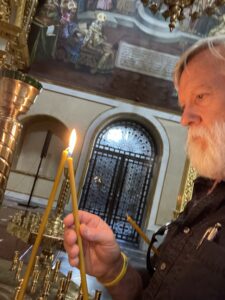
Humility is a necessary element of citizen diplomacy.
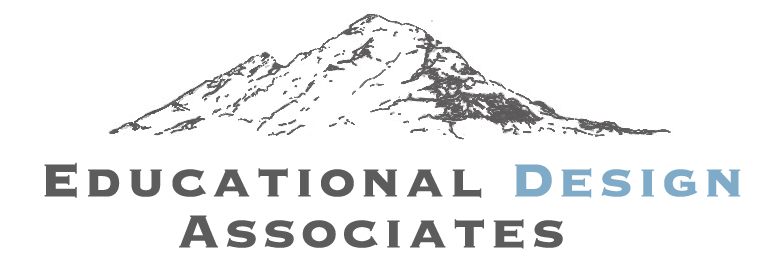
Thank you for sharing details of your amazing trip, and thank you for going in the first place. We can’t begin to imagine living in a war torn area, but we may in the future due to international events. It shouldn’t be beyond our control, but apparently it is due to our current government initiatives.
I appreciate your comment, Allen. Part of what this post is trying to do is to help readers begin to imagine living in a war torn area!
You highlight the question of what is within — or beyond — our control. My bias is that we haven’t fully explored that point, and it is easier to resign ourselves to the idea of our limitations than it is to challenge ourselves to achieve our greatest possible impact. Being an educator at heart, my political focus is upon finding ways to draw people into a greater sense of their own power.
Thanks for this, Daniel. Our armaments industries profit supplying Ukraines fight for democracy as well as Israel’s genocide. The ruling class wins both ways.
Yes… and. Yes, we as a nation are way too deeply enmeshed in the arms industry. No question. And, we need to be as discerning as possible in how we approach the inevitable contradictions that come with such enmeshment. I’ve moved past my earlier bias that “It’s all bad” relative to weaponry into a more nuanced position of seeking ways to scale back on munitions, selectively, to foster a larger transition to peace and justice. It’s complicated. Eventually we need to evolve past warmongering for the sake of life on our planet. In the near term we need to move our government toward more just and rational use of force. It’s going to take time. Also: when people raise their voices about how we need to shrink the size of government, I wholeheartedly agree: Let’s start with the bloated military budget!
Daniel, Thank you for sharing your experience, to help those of us who won’t be going to Ukraine, giving us a sense of what it’s like from the ground…and learning from you. I love how you wrote that courage is inseparable from risk…so many shy away from being courageous because they don’t want to risk take. It’s essential these days in so many ways. And so spot on…us humans can do better! Keep being awesome!!
Well said Daniel…I appreciate your continued and consistent interest and curiosity in others and your efforts to develop yourself, to put yourself at risk and to share freely of what you have gained on your long road to being a grownup, and elder and a leader. Those of us who have experienced your generosity are better for knowing you.